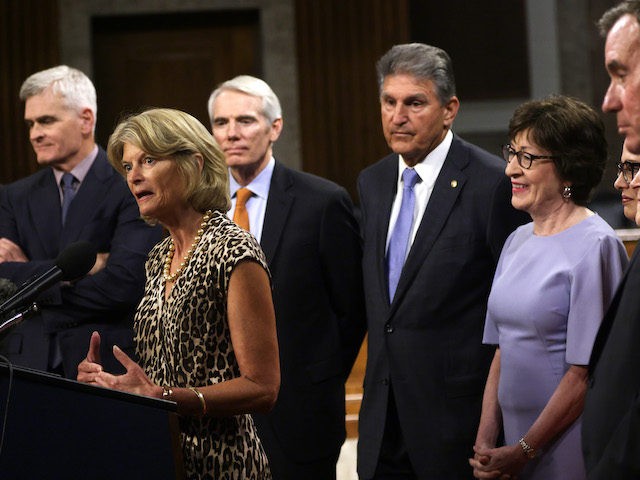The $3.5 trillion budget resolution Democrats released Monday proves the link between the so-called bipartisan and the Democrat infrastructure bill.
Democrats unveiled their massive “infrastructure” bill that would serve as a dramatic expansion of the federal government and create new taxes and government programs.
Many Senate Republicans have attacked the Democrats’ multi-trillion-dollar infrastructure bill even though they support the $1.2 trillion so-called bipartisan infrastructure.
Sen. Rob Portman (R-OH), one of the leading proponents of the bipartisan bill, has insisted that the two bills are not linked and that GOP support for the bipartisan bill would not lead to the passage of the even larger infrastructure bill.
Sen. Bill Cassidy (R-LA), another bipartisan advocate, said the bipartisan bill is “totally separate” from the partisan bill.
“They’re not linked, it is going to increase our debt or else increase taxes, but in terms of our effort it shouldn’t have an impact,” Cassidy added.
However, the text of the budget resolution notes that two infrastructure bills are inherently linked.
Section 4,010 of the budget resolution, which serves as the legislative vehicle for the Democrats’ reconciliation bill, allows for House Budget Committee Chairman John Yarmuth (D-KY) to make changes to the bipartisan bill as he sees fit.
The section reads:
In the House of Representatives, the chair of the Committee on the Budget may adjust the allocations, ag- gregates, and other budgetary levels included in this con- current resolution to reflect changes resulting from the en- actment of an infrastructure bill or joint resolution, in- cluding legislation implementing the INVEST in America Act or a bipartisan infrastructure agreement.
This would appear to prove Senate conservative’s arguments that backing the bipartisan bill would only enable and further the partisan infrastructure bill.
Eighteen Senate Republicans appear poised to pass the bipartisan bill and grant President Joe Biden a significant legislative victory.
The 18 Senate Republicans who voted Sunday to advance the so-called infrastructure reportedly include:
- Roy Blunt (R-MO)
- Richard Burr (R-NC)
- Bill Cassidy (R-LA)
- Shelley Moore Capito (R-WV)
- Susan Collins (R-ME)
- Kevin Cramer (R-ND)
- John Hoeven (R-ND)
- Mitch McConnell (R-KY)
- Lisa Murkowski (R-AK)
- Rob Portman (R-OH)
- Jim Risch (R-ID)
- Mitt Romney (R-UT)
- Thom Tillis (R-NC)
- Deb Fischer (R-NE)
- John Cornyn (R-TX)
- Roger Wicker (R-MS)
- Dan Sullivan (R-AK)
- Mike Crapo (R-ID)
Sens. Ron Johnson (R-WI), Rick Scott (R-FL), Marsha Blackburn (R-TN), Mike Braun (R-IN), Ted Cruz (R-TX), Josh Hawley (R-MO), and Mike Lee (R-UT) released a joint statement in early August, contending the bipartisan infrastructure bill, or the Infrastructure Investment and Jobs Act serves as only the beginning of the Democrats’ “liberal wish list.”
The Senate conservatives said:
We can’t spend money we don’t have. Period. Just look at what is happening with inflation. We were promised this infrastructure bill was fully paid for, and now we see that it’s not. This was nothing more than a bait and switch. $205 billion of this bill was to be paid for with repurposed COVID funds. The latest proposal only shows $50 billion in COVID funds being used, as well as a lot of the proposed ‘pay-fors’ missing. So we are asking our colleagues: How is this infrastructure spending bill being paid for? We still don’t know. We still don’t have a score on this legislation from the Congressional Budget Office. Let’s not forget, this is just the first step in the Democrats’ plan to pass their $5.5 trillion tax-and-spend liberal wish list.
They added, “We support infrastructure, but it has to be paid for. This proposal isn’t it.”
Sean Moran is a congressional reporter for Breitbart News. Follow him on Twitter @SeanMoran3.

COMMENTS
Please let us know if you're having issues with commenting.